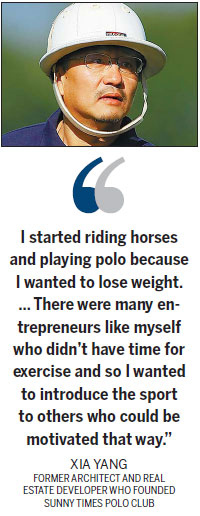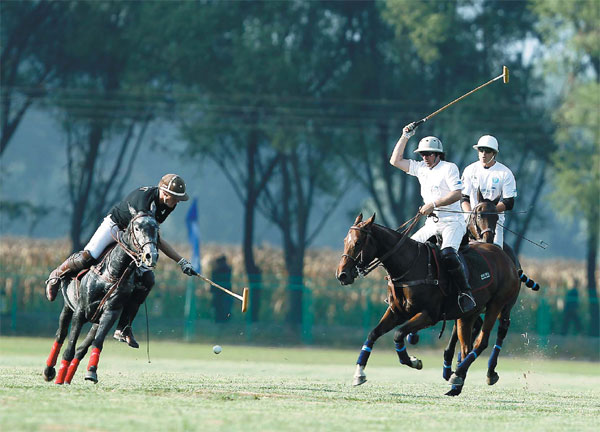Polo hits its stride
Updated: 2014-10-24 14:26
By Mike Peters(China Daily Europe)
|
|||||||||||
Sport steeped in tradition is gaining popularity in China
First-time visitors to China recently might be forgiven for thinking they had landed somewhere else by mistake, somewhere like England or Monte Carlo. As the summer heat broke, the Beijing calendar was suddenly chock-full of polo, with a string of September tournaments in the capital and a five-day international meet in Tianjin during October's National Day holiday week.
The sport of kings was once unimaginable in New China, but a lot of things have changed since the reform and opening-up led by Deng Xiaoping began in 1979.
Today the phenomenon can seem like one more manifestation of China's new rich. Besides the pricey fee for club membership - assuming one is invited - polo enthusiasts have spent as much as 3 million yuan ($488,700, 380,000 euros) for a prize pony, according to foreign media reports.
"Nothing says 'international lifestyle' and 'aristocracy' quite like polo," the president of Tianjin Goldin Metropolitan Polo Club, Roland Wong, told the South China Morning Post soon after that huge venue opened in 2010.
"Twenty years ago, playing golf meant you were someone, but now for a few hundred yuan anyone can play golf," he said. "Golf has no princes, no models, but in polo you put your boots and helmet on and everyone is the same, and Prince Harry comes up and shakes your hand."
That cachet has made companies such as Swiss watchmaker Longines and SUV maker Land Rover, just two of the luxury brands that sponsor horsemanship events in China, salivate over the country's up-and-coming "polo class".
Other promoters of the sport in China want to push past the notion that a 300-meter-long polo field is just another playground for the newly rich.
"I started riding horses and playing polo because I wanted to lose weight," says Xia Yang, the millionaire former architect and real estate developer who founded Sunny Times Polo Club a decade ago. "It seemed like a fun and interesting way to get fit, and it worked," he says, noting that he dropped 5 kg in two months. "There were many entrepreneurs like myself who didn't have time for exercise," he says, "and so I wanted to introduce the sport to others who could be motivated that way."
Xia, whose club hosted the Beijing Polo International Open in mid-September, says that while riding courses can cost 250 yuan to 400 yuan an hour, that does not limit equestrian sports to the super-rich.
"Tennis lessons cost money, too," he says, adding that many people will also spend several hundred yuan on a nice dinner.
Most of all, he says, playing polo is not the sort of conspicuous consumption designed simply to shout, "I've got money.
"The sport takes a lot of time and effort," says the man whose peers call him the godfather of polo in China. It is not like buying a new Ferrari and driving it down the middle of a road in Beijing for all to see, he says.
Polo enthusiasts are building an industry that creates jobs and infrastructure, he insists. He says polo will continue to grow despite the central government's crackdown on extravagance because of its potential as part of a growing sporting-horse industry.
Xia says that is why China's polo clubs - about half a dozen in number, with additional sites hosting less formal events - still enjoy the eager embrace of local governments. He says events such as beach polo in Dalian and snow polo in Tianjin have made the sport more spectator-friendly.
Many experts doubt such enthusiasm is sustainable because betting on horses is illegal in China. Foreign investors have been excited by the prospect China may loosen up on that ban, but since 1949 gambling has been viewed as the sort of Western-fueled decadence that has cost China dearly in the past. Once-eager investors are beginning to sense that is not going to change anytime soon.
That does not worry Xia, who believes building a thriving horse industry will be a tourism boon even without gambling.
"Dubai is a great example for China," he says, adding that the tiny emirate has developed a lucrative equine industry that attracts many tourists - despite a ban on placing bets there.
"We have a staff of 70 now," he says, counting employees ranging from horse trainers, riding instructors, security guards and administrative clerks. Xia expects to employ about 10 times that many in a few years, with his ambitious plans to build an equine culture center that includes not only professional and amateur tournaments but company retreats, weekender packages and riding lessons at the resort complex he plans to build at the polo club, which is tucked in the hills near the Great Wall at Badaling.
The temperature is pleasant. The air is clean. The horses are beautiful and engaging. What is not for tourists, and local visitors, to like?
He is also eager to educate visitors about the history of horsemanship in China.
While Britain and Persia, now Iran, are steeped in polo tradition, horses are nothing new in China, though competition horses bred in China are now generally sired from imported stock.
Xia eagerly shows visitors a Tang Dynasty (AD 618-907) painting of cavorting horses and their riders, a scene he has re-created in sculpture. Xia took up the art as one way to promote the culture of the horse, and his artworks range from tabletop animals with imperial topknots to life-size models of contemporary breeds.
For the past two years, he has been sculpting horses with the same passion he has for the animals themselves.
"Horses are like my children," he says, clicking his tongue as he takes visitors on a stroll to an expansive enclosure for nursing mares and their foals. The young horses stir as he approaches, several trotting to the fence to arrive at the same moment he does.
"I have watched the birth of most of the horses here, maybe all of them," he says, smiling. As we return to the main building where he has his office and sculpting studio, we watch as trainers pace two horses around a cantering ring.
"It's like music," he says of the gentle rhythm of the hooves.
If he has his way, a lot more Chinese will get to hear it.
Liu Xiangrui contributed to this story.
michaelpeters@chinadaily.com.cn
|
A member of the Chinese polo team (left) and Argentine rivals during this year's Beijing International Polo Open Tournament. Zhu Xingxin / China Daily |

(China Daily European Weekly 10/24/2014 page26)
Today's Top News
Highlights of Shenzhen Int’l Photography Week
Palace Museum needs to design landmark souvenirs
In Guangdong, 42 hours of fear
Ambassador urges young people to build up ties
Capital outflow fears unfounded
New proposals for care of the elderly
European Council appoints new commission team
Financing of projects focal point for APEC
Hot Topics
Lunar probe , China growth forecasts, Emission rules get tougher, China seen through 'colored lens', International board,
Editor's Picks

|

|

|

|

|

|






